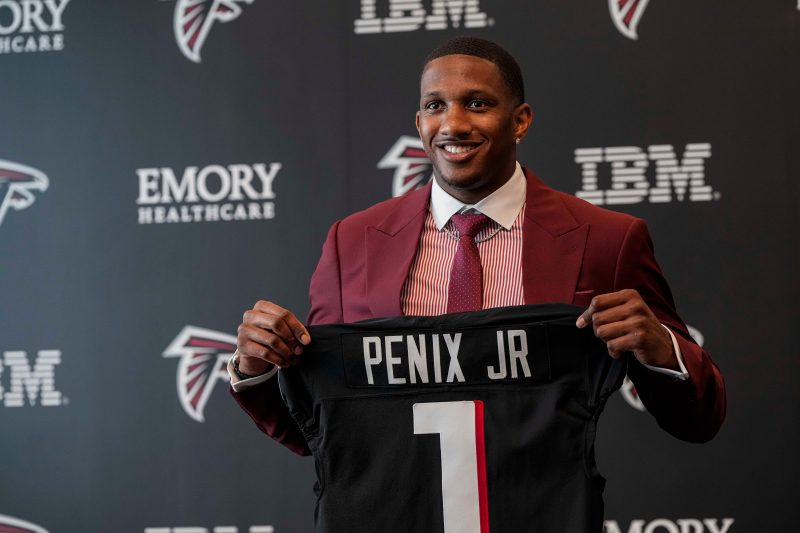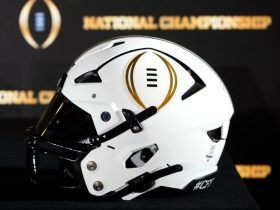The Atlanta Falcons sent shockwaves through the NFL during the 2024 draft when they selected Washington quarterback Michael Penix Jr. with the eighth overall pick.
On the surface, this looks normal for a franchise that has struggled to find consistent play under center. However, just weeks before the draft, Atlanta made one of the biggest splashes in free agency when they signed veteran quarterback Kirk Cousins to a massive contract.
Here’s why Atlanta spent the draft capital on the passer:
Why did the Falcons draft Michael Penix Jr.?
While the Falcons seemed set at the quarterback position after the signing of Cousins, Atlanta GM Terry Fontenot made it clear at his post-Round 1 press conference that he simply believed in Michael Penix Jr.’s talent:
NFL STATS CENTRAL: The latest NFL scores, schedules, odds, stats and more.
‘If you believe in a quarterback, you have to take him, and if he sits for four or five years, that’s a great problem to have because we’re doing so well at that position,’ Fontenot said. ‘So, it’s as simple as, if you see a guy you believe in at that position, you have to take him.’
He would add that Penix’s intangibles and traits would push the front office into making the selection. Fontenot made it clear that Cousins would be the starter entering the season, which he has been. With Cousins’ current contract, it’s difficult to envision Penix Jr. under center anytime soon.
The left-handed passer from Washington is well-known for his outstanding character and ability to handle adversity. Fontenot received owner Blank’s blessing just a few weeks after giving Cousins $100 million guaranteed and made the selection.
Penix Jr. comes from a pass-heavy system run by Ryan Grubb, now the Seattle Seahawks offensive coordinator. Atlanta felt that Penix fits what their new offensive coordinator, Zac Robinson, coming from Sean McVay’s offense, would like from a quarterback. He excels as a pocket passer, similar to Matthew Stafford and Cousins.
In his final season at Washington, Penix Jr. led the FBS with 4,903 passing yards, ranked third in passing touchdowns with 36, and was a Heisman Trophy finalist. He is a 24-year-old rookie and can develop quickly behind Cousins. Some draft experts give him an NFL comparison to Tua Tagovailoa.
The Falcons had franchise quarterback Matt Ryan in the building not too long ago. They moved on from the former MVP before the 2022 season when they traded him to the Indianapolis Colts. Subsequently, they signed veteran Marcus Mariota and drafted Desmond Ridder in the third round. Atlanta went 7-10 the past two seasons and decided an overhaul of the quarterback room was necessary heading into 2024.
Owner Arthur Blank also hired a new coaching staff after firing Arthur Smith, who spent three years with the team. On Jan. 25, Atlanta hired former Los Angeles Rams defensive coordinator Raheem Morris as its next head coach. With a new regime in town, they didn’t wait long to assess the quarterback position. On March 11, Atlanta signed Cousins to a four-year, $180 million contract. NFL fans and media assumed this would be the decisive move of the offseason and would thrust the Falcons to the top of the NFC South.
However, despite the harsh reactions across the league for the draft selection, some forgot: Cousins suffered a torn Achilles on Oct. 29 last season with the Minnesota Vikings. The 36-year-old signal-caller isn’t guaranteed to return to his pre-injury performance on the field. Having a high-quality replacement like Penix Jr. could be what Atlanta needs if Cousins struggles in his return.
Atlanta could adopt a similar model to the one the Green Bay Packers have found successful. Green Bay drafted Jordan Love with the 26th overall pick in 2020, and he sat on the bench behind Aaron Rodgers for three seasons before being named the starter.
Kirk Cousins contract
The Falcons quarterback signed a four-year, $180 million contract with $100 million guaranteed. His contract with Atlanta includes a no-trade clause.
We occasionally recommend interesting products and services. If you make a purchase by clicking one of the links, we may earn an affiliate fee. USA TODAY Network newsrooms operate independently, and this doesn’t influence our coverage.






